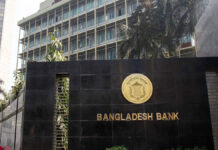 FRANKFURT: German sportswear giant Puma said Wednesday it has decided to sign up to a new safety pact for Bangladesh's disaster-hit garment factories amid calls for Western brands to help improve workers' conditions.
FRANKFURT: German sportswear giant Puma said Wednesday it has decided to sign up to a new safety pact for Bangladesh's disaster-hit garment factories amid calls for Western brands to help improve workers' conditions.
Puma said it will sign the Bangladesh safety agreement set up by global trade union IndustryAll and ensure that its six supplier factories in Bangladesh “adhere to high standards of social and working conditions, ensuring the safety and health of its workers”.
By signing the agreement, Puma's supplier factories will have to undergo independent safety inspections and audit reports will be made public.
Carrying out repairs and renovations that result from the independent inspections are mandatory for the supplier.
While European brands such as H&M, Zara, Marks & Spencer and major supermarket buyers have committed to the agreement and its fire and building inspection regime in the wake of the Bangladesh garment factory tragedy in April, US retailers such as Gap and Walmart have refused to sign up.
“The agreement requires Puma to underwrite the costs and to cut off business with any factory that refuses to make necessary safety upgrades. It gives workers and their unions a role in the process according to the non-profit Worker Rights Consortium,” said chief commercial officer Stefano Caroti said.
Puma sources 11 percent of its apparel products from six supplier factories in Bangladesh.
More than 1,100 workers were killed when a building housing several factories collapsed in Savar just outside the capital in April, highlighting the poor safety record of the world's second-biggest garment exporter after China.
International workers' associations such as Swiss-based UNI and IndustriALL Global Union have pressured Western retailers to sign up to the legally binding Accord on Fire and Building Safety.
The Bangladesh Garment Manufacturers and Exporters Association, which represents 4,500 garment factories, has welcomed the agreement as “a reflection of Western retailers' long term commitment to Bangladesh”.
It says retailers accounting for about half of the country's $20 billion apparel sales have now signed up. Walmart, which accounts for 10 percent of orders in Bangladesh, is the most significant player to opt out.
Source: The Independent










